10 June 2002
Belgrade, Serbia
Boško Buha
Profession
Security
Motive
Governance targeting


Adolfo Olivas


Ahmed Divela


Amit Jethwa


Artan Cuku


Babita Deokaran


Bayo Ohu


Berta Cáceres


Bhupendra Veera


Bill Kayong


Boris Nemtsov


Boško Buha


Chai Boonthonglek


Charl Kinnear


Chut Wutty


Chynybek Aliev


Cihan Hayirsevener


Daphne Caruana Galizia


Darío Fernández


Derk Wiersum


Deyda Hydara


Édgar Quintero


Edmore Ndou


Edwin Dagua


Federico Del Prete


Fernando Villavicencio


Gezahegn Gebremeskel


Gilles Cistac


Habibur Mondal


Igor Alexandrov


Jacob Juma


Ján Kuciak


Javier Valdez


Joannah Stutchbury


José Ángel Flores


Jules Koum Koum


Kem Ley


Luis Marroquín


Mahamudo Amurane


Marcelo Rivera


María Elena Ferral Hernández


Marielle Franco


Milan Pantić


Milan Vukelić


Muhammad Khan


Nelson García


Nihal Perera


Oliver Ivanović


Orel Sambrano


Perween Rahman


Peter R. de Vries


Rajendra Singh


Salim Kancil


Sandeep Sharma


Sikhosiphi Radebe


Slaviša Krunić


Soe Moe Tun


Victor Mabunda


Virgil Săhleanu


Wayne Lotter


Yuniol Ramírez


Zezico Guajajara
10 June 2002
Belgrade, Serbia
Profession
Security
Motive
Governance targeting
In the early hours of the morning on 10 June 2002, Boško Buha, a general in the Serbian police and a deputy head of Public Security, headed home with a group of friends. They’d had dinner at one of the floating restaurants on the Danube in Novi Beograd, Belgrade’s largest municipality. No one imagined then that Buha would be brutally assassinated that night.
He was ambushed in a hotel parking lot, where he was shot multiple times with an assault rifle at point-blank range as he approached his car. He was still breathing when the ambulance and his police colleagues arrived at the scene. But he had bullet wounds to the chest, which meant there was very little the medical team could do.
The shooter, who appeared to be a trained professional, immediately fled the scene. A large-scale investigation was launched, but it was hard to find physical evidence, since heavy rain had interrupted crime scene investigators that night.
Buha, a former Belgrade police chief, was known for speaking out against organized crime. Despite the lack of leads, there was a large degree of political pressure to solve the case, which catalyzed one of the most extensive investigations Serbia had ever seen. Dušan Mihajlović, the interior minister at the time, vowed that police would check every ‘criminal nest’ and interview everyone with a criminal record. This tactic seemed to work for the investigators, who were able to make initial arrests in October 2002 after interviewing dozens of people.
The police identified Nikola Maljković as the main suspect. Maljković was a member of a Belgrade gang known as the Makina Grupa. The gang’s leader, Željko Maksimović Maka, was never arrested and is still wanted by INTERPOL.
To date, no one has been convicted for Buha’s murder, nor have the investigators been able to present a clear motive. The trial and the investigators’ conduct would later be discredited because of alleged criminal procedures in the course of the investigation.
So, why was Boško Buha a target for a professional hitman? The answer might be found in his statements in the media and the sensitive information he’d made public.
Vojislav Tufegdžić is a Serbian journalist and the author of a famous documentary about Belgrade’s crime scene, called See You in the Obituary. In a series about unsolved crimes, Tufegdžić explains that Buha never hesitated to describe the real state of affairs in Serbia following political changes and the overthrow of former president Slobodan Milošević. ‘He was saying that former powerful gangs that dealt in stolen vehicles had been diminished, but also warned that drug trafficking was in full swing,’ wrote Tufegdžić. Buha was proud of the work he’d done to bring down the car mafia while he was Belgrade’s chief of police. Many of these criminal groups were arrested, and a few mobsters were killed in shootings with the police. Buha not only spoke out about organized crime on the whole, but also warned the public that criminal groups were trying to connect with the new, pro-democratic government.
‘I was offered to get in touch with people from the underground scene. Mafia tried to ingratiate themselves with people from DOS [a coalition of pro-democratic parties that came to power after the fall of Milošević]. They were offering different services and money to politicians, and even files that could be used to compromise their political opponents,’ Buha said in an interview six months before he was killed. He also explained that gangs had armies of soldiers in Belgrade, and that their business was car theft, drug trafficking, extortion and kidnapping.
Could such statements show that Buha knew too much about the perilous intersection where organized crime meets politics? The answers may never be revealed, since most of the suspects fled from Serbia years ago.

Mourners at the funeral of Boško Buha

Mourners remember Buha
One theory, however, points to the fact that organized-crime groups were angry about Buha’s police work. He had been working on the so-called ‘White book of organized crime’, a document of the Serbian Ministry of the Interior that exposes some 118 organized-crime groups. These groups were alleged to have been responsible for some of the most serious crimes committed in Serbia. The book was published in 2002 and attracted huge media coverage.
Tamara Marković Subota is a prominent Serbian crime journalist who reported on Buha’s killing. According to her, the Special Forces of the Serbian police were found to have been involved in the case to solve Buha’s murder. Although that may not seem unusual, it should be noted that the counterterrorism commandos that form part of the Special Forces worked alongside Serbia’s most notorious criminal group, the Zemunski Klan. Through its involvement in the investigation, the Zemunski Klan would have aimed to clear its members from being implicated in Buha’s murder. On other occasions, members of the group had been tried in 17 murder cases, three kidnapping charges and two terrorist attacks.
Furthermore, the ‘informal investigations’ were led by Milorad Ulemek Legija, commander of the Special Forces. Legija would later be sentenced for organizing the assassination of Serbian Prime Minister Zoran Djindjić in 2003. ‘We never found out who ordered Legija to get involved in this case. That was never investigated,’ says Marković Subota.
‘Nikola Maljković, a lead suspect, even refused to say that he would stay silent during the court process. Anything he said could have been used to compare voices on phone calls that the police had secretly recorded. This way, the main piece of evidence was dropped,’ Marković Subota explains, recalling the trial held in 2004 in the Special Court in Belgrade.
The story behind the arrest of the alleged perpetrators was said to be full of holes. One of the mobsters who worked with Maljković and Maka was kidnapped by rivals from the Zemunski Klan. He was reportedly tortured until he agreed to testify that Maka had arranged Buha’s assassination.
Due to the lack of evidence, all the suspects were acquitted and released from custody. As Marković Subota recalls, they seized the opportunity and left Serbia. Maka was never arrested in the first place. ‘The Higher Court ordered a retrial, but without indictees, the start of a new trial was never scheduled.’


8 April 2017
Tirana, Albania
Artan Cuku


27 February 2015
Moscow, Russia
Boris Nemtsov


19 December 2009
Bandirma, Turkey
Cihan Hayirsevener


16 October 2017
Bidnija, Malta
Daphne Caruana Galizia


18 September 2019
Amsterdam, Netherlands
Derk Wiersum


18 February 2002
Casal di Principe, Italy
Federico Del Prete


1 July 2001
Slavyansk, Ukraine
Igor Alexandrov


21 February 2018
Veľká Mača, Slovakia
Ján Kuciak


11 June 2001
Jagodina, Serbia
Milan Pantić


6 November 2007
Banja Luka, Bosnia and Herzegovina
Milan Vukelić


16 January 2018
North Mitrovica, Kosovo
Oliver Ivanović


15 July 2021
Amsterdam, The Netherlands
Peter R. de Vries


22 April 2019
Banja Luka, Bosnia and Herzegovina
Slaviša Krunić


7 September 2000
Iași, Romania
Virgil Săhleanu